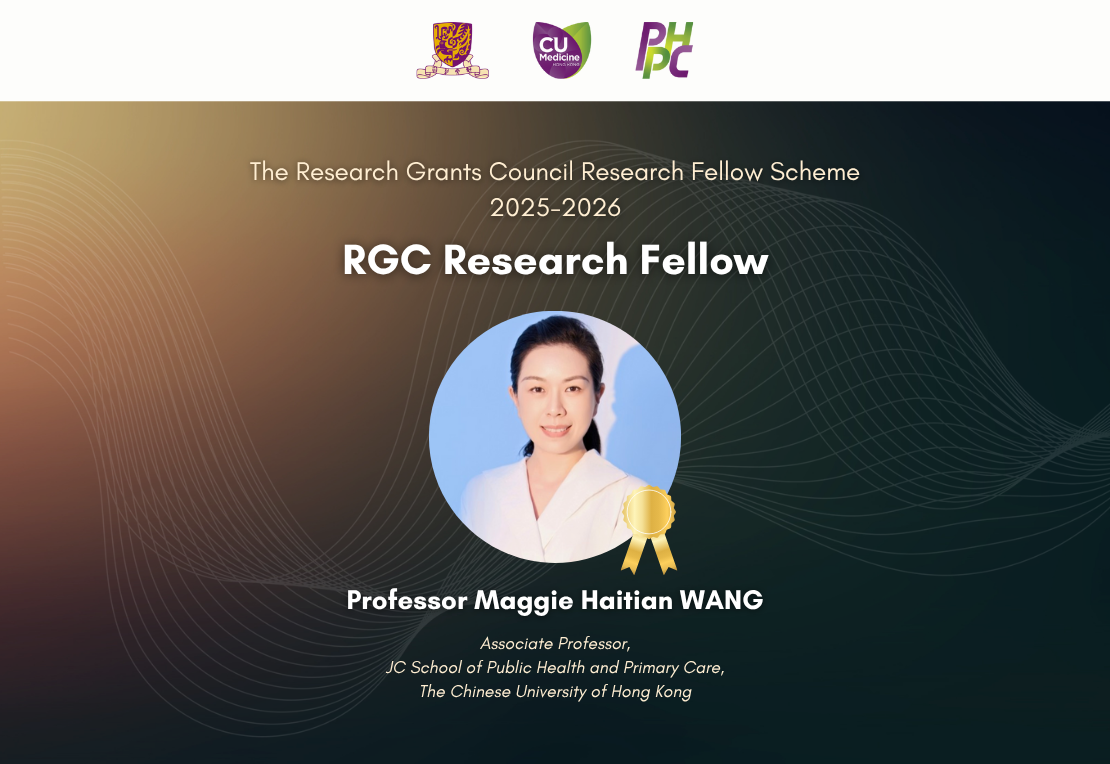
Professor Maggie Haitian Wang, Associate Professor at the JC School of Public Health and Primary Care, Faculty of Medicine, The Chinese University of Hong Kong (CUHK) has been conferred the prestigious title “RGC Research Fellow” – the only woman and medical scientist among the 11 scholars recognised for the award by the Research Grants Council (RGC) this year.
Prof. Wang’s research project is “Integrated Computational Platform for Antigen Design of Therapeutic Vaccines for HPV-mediated Cervical Cancer”. HPV, or Human Papillomavirus, is a group of viruses comprising over 150 different genotypes. Persistent infection with high-risk HPV types may lead to abnormal proliferation of cervical cells, forming tumour-like precancerous lesions, and may even progress to cervical cancer. Vaccination against HPV is one of the measures to reduce viral infection and lower the risk of malignant transformation.
The research team aims to develop a therapeutic HPV vaccine candidate to treat cervical intraepithelial neoplasia (CIN) caused by HPV infections, using a computational platform that integrates novel technologies invented by the research team. The objectives of this project include characterising genomic variations of common HPV types in China and developing computational methods for T-cell epitope prediction1 to design epitope-enriched vaccine antigens.
The project also aims to optimise antigen sequences using the research team’s proprietary protein codon optimisation (PCO) technology, which has higher potency than existing approaches, to generate the final candidate. Beyond this project, the platform it establishes could also be applied to design antigens for other virus-mediated diseases and holds significant translational potential in the pharmaceutical industry. With collaborative efforts, the outcomes of this project will facilitate future innovative vaccine development in Hong Kong.
The RGC Research Fellow Scheme and RGC Senior Research Fellow Scheme aim to provide sustained research support integrated with relief from teaching and administrative duties for outstanding mid-career researchers at Associate Professor rank and senior researchers at full Professor rank respectively at publicly funded universities in Hong Kong, to facilitate academics to dedicate their career to research and development as well as to give them the time and resources to nurture and train the next generation of local research talent for Hong Kong.
Across Hong Kong, nine scholars were awarded the RGC Senior Research Fellow Scheme and 11 scholars the RGC Research Fellow Scheme in the year 2025/26. Seven scholars from CUHK have received awards from the two schemes, including three conferred the titles of “RGC Senior Research Fellow” and four the titles of “RGC Research Fellow”. CUHK will receive a fellowship grant of about HK$8.2 million per SRFS award and HK$5.5 million per RFS award to cover salary costs for relief teachers and support for research projects over a period of 60 months.
- T cells are a type of lymphocyte primarily responsible for identifying and attacking infected cells, tumour cells, or other abnormal cells. Cancer cells present cancer-associated peptide fragments (pMHC) on their surfaces via MHC protein molecules. T cell receptors can recognise these peptide fragments, thereby initiating an immune response to kill cancer cells. These peptide fragments are known as T cell antigen epitopes. ↩︎
